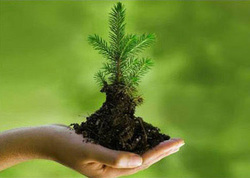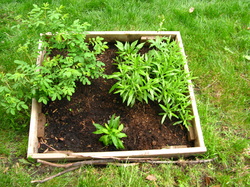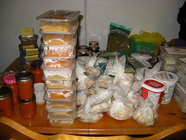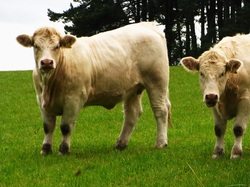 Anyone else sick of these super generic photos? You know what to do - turn off the lights when you leave the room, recycle, turn off the water when you're brushing your teeth. That's what I grew up with hearing, and you probably did too. Now there are tons of tips to "go green", from everything to forgoing the receipt at the ATM, to search on Blackle instead of Google. I definitely encourage everyone to do as much as they can, and if they feel motivated to make these small changes, go for it. We need all the help we can get, and if that means switching to one energy-saving lightbulb, awesome. But let's face it - only switching to organic milk and bringing a reusable mug is not going to solve our environmental problems. Climate change, mass losses of biodiversity (I learned today at the Botanical Gardens that 130 species go extinct a day), complete dependence on fossil fuels, our obsession with stuff - we have some huge issues to deal with. We gotta step it up. It's hard not to feel defeated sometimes. I often see that people want to do good, but they think that they're just one person - what can they do? Or, sometimes people are super proud that they recycle, but then take long flights to Europe every year or drive an insanely inefficient car. I read a study the other day that found that the more guilty people felt about their environmental impact, the more likely they were going to do something about it. Not that I'm advocating that we make everyone feel guilty about their actions (which would probably lead to denial and apathy), but the study also felt that people in the US who felt that their individual actions made a difference for the environment were also the most likely to have a huge eco-footprint. I think that people don't know how much their actions really make a difference (positive or negative), and So to help clear things up, I've made a list. First, calculate your carbon footprint with myfootprint.org to put it all into perspective. I calculated that I've reduced my environmental impact by SIX times by following these steps.  If you only do 5 things for the environment, here's what you should do: 1. Eat local (preferably from your backyard) Most of our produce is shipped from really far away, on gigantic farms that only grow one crop, and sprayed with tons of pesticides. This way of farming is totally dependant on huge chemical companies (like Monsanto, my fave), fossil fuels, and exploiting cheap migrant labour. Even if you know nothing about gardening, you can join a community garden, get an old person to help you (I learned almost everything I know from my Papa), or start with some tomato plants or a little herb garden. Fresh food tastes so good, and it's super satisfying to eat something that you grew from a seedling. Growing your own food is cheaper than buying it in the store, it's healthier since there won't be any pesticides, and it doesn't get any more local than your backyard. If you have extras of certain food (and you will), you can freeze it, can it, pickle it, make spaghetti sauce, or bring some zucchini over to your friends.  Hold a food swap with your extra stuff! If you don't have a backyard, start one in your apartment. Grow herbs on your windowsill, sprouts in your kitchen, or mushrooms, if you're daring. And if you are way too busy or kill everything you touch, join a community supported agriculture (CSA) in your area. You'll pay for a season's worth of vegetables up front or in instalments, and then you get a basket of super fresh food every week. When you're in the grocery store, try to pick the most local food, which can be as simple as picking the apple from Quebec instead of the one from New Zealand. Then compost your food waste. Food doesn't really decompose in landfills since there's no oxygen, and instead it releases methane, which is a powerful greenhouse gas. 2. Ditch your car. You don't have to get rid of it completely. Cars are extremely useful for going places or carrying heavy things. But you don't need your car to take you two blocks away. And you don't need your car if your neighbour is also going to the same place at the same time. And you don't need to make ten trips for errands if you can get it all done in one shot. Cars are a total hassle to park (especially in the city), and something in your car will inevitably break, which will be expensive. By avoiding your car, you'll save money on gas and prevent adding greenhouse gas emissions.  Huh? Meatless Monday? 3. Go meatless sometimes (or all the time). Thanksgiving turkey, Christmas ham, Sunday roast, hot dogs over a fire, summer barbecues - eating meat is definitely in our culture. There are some health benefits to eating meat and animal products, and there are few people who can resist the smell of bacon in the morning. Eating meat at every meal though - or even every day - is unnecessary, actually kind of expensive, and contributes big time to your ecological footprint. To grow all of these animals, farmers need corn - lots of corn which is grown with pesticides. Cows are actually supposed to be eating grass, not corn, so it makes them fart, and this methane contributes to climate change (not making this up). In 2006, it was estimated that meat production contributes to 14-22% of greenhouse gas emissions. A nonvegetarian diet needs 2.9 times more water, 13 times more fertilizer, and 1.4 times more pesticides than a vegetarian diet (Marlow et al. 2009). Most people can't quit meat cold turkey, so first try to go Meatless Monday. If you grew up with a standard meat and potatoes family dinner like I did, you might have no idea what kind of food to make. So many vegetarians are asked "so you only eat salad?!?" when really, with a little of bit of creativity and grocery shopping, their plates look way more appetizing than the usual pork chops and steamed broccoli. If you need a little inspiration for vegetarian recipes, check out Yummly, Vegetarian Times, or Veg Web. For some amazing vegan recipes, I love One Lil' Vegan's blog. 4. Buy second-hand. It takes 713 gallons of water to make one tshirt. We often don't think that stuff we buy - new cell phones, pants, laptop, sofas, whatever, comes from resources that have to be mined or cut down, and processed, and transported until we get them. Buying new stuff is a drain on water and energy, and then we have to think about what to do with all of this stuff when we're done with it. Most of this stuff can be recycled, but often we don't recycle it. We could just throw it out, but where does all that stuff go? I think most people have the idea that our plastic stuff will break down eventually, but it supposedly takes thousands of years in a landfill for stuff to decompose. Let's face it- that's pretty much never. Your stuff will be there forever, even after you're gone. Use freecycle.org, scout out the free sections of Craigslist, or borrow stuff from your friends. If you have friends the same size as you, organize a clothes swap (my fave way to get free, pretty clothes) or shamelessly snatch furniture, old appliances, and random good stuff from the garbage. 5. Put on (or take off) your sweater Air conditioning and heating are the biggest energy-users in your house. Turn down the heat and wear a sweater and socks in the winter, and open the windows and prance around in your undies in the summer. (Kidding. You probably won't do that. But you know what I mean.) If you have a thermostat, program it so that your heating or cooling only kicks in during the hours that you're home - why waste money heating an empty house? And if you do turn on the heat or air conditioning, make sure it can't escape (like through drafty doors or open windows). And my last tip - when you're washing your sweaters and socks, wash them in cold and dry them on a line. Heating water and clothes up is also a big energy guzzler. Simple, right? Okay, maybe not. I know that doing "the right thing for the environment" can often seem confusing, but I really think that our society needs some perspective. I know most people aren't as nerdy as I am and want to know the carbon footprint of a banana or a computer, but I think if everyone followed these five ideas, we would all have a smaller environmental impact. It's not too late to make changes - but we need to make the right changes.
0 Comments
|
About ShonaI'm an eco-conscious girl from Montreal, Quebec. I'm currently an adjunct science professor at Champlain College of Vermont (Montreal Campus). I'm interested in any opportunities to expand my experience with grassroots activism, climate change legislation, or environmental education. Archives
March 2016
Categories
All
|

 RSS Feed
RSS Feed
